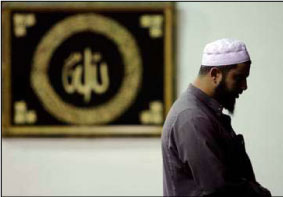Younger, US-Born Inland Imams Emerging
By David Olson

Mohamed Mabrouk wears the traditional white robe of an imam. But instead of the foreign-accented English that for decades has been the norm among American Muslim religious leaders, the new 21-year-old leader of a Murrieta mosque speaks with the Detroit accent he has carried with him from childhood.
Mabrouk’s appointment last month as imam of the Islamic Center of Temecula Valley is a sign of a changing Inland Muslim community that is shifting from being almost entirely immigrant-led to one in which young, US-born people are increasingly taking leadership roles.
Last year, the Islamic Center of Corona-Norco selected then-29-year-old US-born Osman Umarji as imam.
The membership of mosques is also becoming more American-born, as the children of Muslim immigrants who arrived in the United States in the 1970s, ’80s and ’90s make up a rising percentage of worshippers.
When Sudanese-born Mustafa Kuko became imam of the Islamic Center of Riverside in 1998, only about 2 percent of those attending the mosque were born in the United States. Today, Kuko said, about 15 percent are, and the number continues to rise.
Kuko, 63, welcomes the trend toward more US-born imams. He freely acknowledges that young, US-born Muslims often can relate better to an imam who grew up in the United States than to a foreign-born man like himself.
“These are the people who know the culture, who know how to eat hamburgers and know baseball,” Kuko said with a laugh.
The new imams also can help guide youths through the post-9/11 era, when Muslims have faced prejudice and misunderstandings, said Munira Syeda, spokeswoman for the greater Los Angeles office of the Council on American-Islamic Relations.
The Islamic Center of Temecula Valley endured protests when it applied to construct a new, permanent building in Temecula to replace its temporary locations. Other non-Muslims supported the proposal. The city in January 2011 approved the request.
Syeda said she is buoyed as the growing US-born population in Muslim congregations is producing imams immersed in American culture.
“It helps young people develop a Muslim-American identity — not just a Muslim identity and not just an American identity, but a Muslim-American identity,” she said.
Many foreign-born imams in the United States were recruited directly from abroad and had little knowledge of US culture, said Muhamad Ali, an assistant professor of religious studies at UC Riverside.
Hadi Nael, 57, chairman of the Murrieta mosque, said when the former imam, Syrian-born Mahmoud Harmoush, declined to renew his contract in November, the board made “youth” and “US-born status” among its top factors in its search for a new religious leader.
“The new imam needed to attract the youth of this community because the future generation will be leading this community,” Nael said.
STUDY IN CANADA: Mabrouk was born and raised in Detroit, then went to an Islamic boarding school in Canada where, between ages 12 and 16, he received the religious training that prepared him to become an imam.
In Islam, imams are not ordained and they are not considered clergy, so their degree of training varies.
After boarding school, Mabrouk attended most of his high school and university time in Arizona. Temecula is his first posting as an imam.
Mabrouk has been through what many Inland Muslim youths face.
He walked down high school hallways with girls in revealing clothes and, as a player on his high school basketball team, a few times he got invited to parties where girls and boys mixed and alcohol was served.
Mabrouk talks to kids in their language, always adhering to Islamic teaching but not condemning them for struggling with temptations that the Quran teaches are a part of being human.
“I’m real blunt with the youth,” he said. “I say it as it is. Instead of just saying, ‘Allah says don’t do this, so don’t do this,’ what I do is give them the facts and explain to them why they’re not supposed to do something.”
Dina Larson, who attends the Murrieta mosque, said she didn’t feel comfortable talking with Harmoush about problems.
“As a 15-year-old girl going up to someone who’s my dad’s age, I’m just thinking it would be awkward,” said Dina, who immigrated to the United States from Morocco at age 2.
But Dina said she views the new imam as approachable.
“He’s more youth-oriented,” Dina said. “If I ask him for some advice — ‘Oh, I did something I regret,’ or ‘I have a question about something I should do,’ he’d understand more.”
In his eight months as imam at the Corona mosque, Umarji has broached matters such as dating, alcohol, drugs and homosexuality in sermons because he knows that young people are thinking and talking about those issues. They are topics that have long been considered taboo for Muslims to discuss, and Umarji wants Muslim youths to feel free to talk about them, and for parents to not shy away from them, either.
Umarji grew up in Los Angeles and, like Mabrouk, mixed easily with non-Muslim students at his public high school while adhering to his Muslim beliefs. He attended UC Irvine and worked as an engineer for four years before becoming imam. He and his wife are raising two children.
Umarji can easily relate to U.S.-born Muslims because it’s been his life.
“It’s not just being born in this country but knowing day-to-day life here,” he said. “That allows us to know the challenges people face.” – The Press-Enterprise.
Back to Pakistanlink Homepage
-------------------------------------------------------------------------------------

